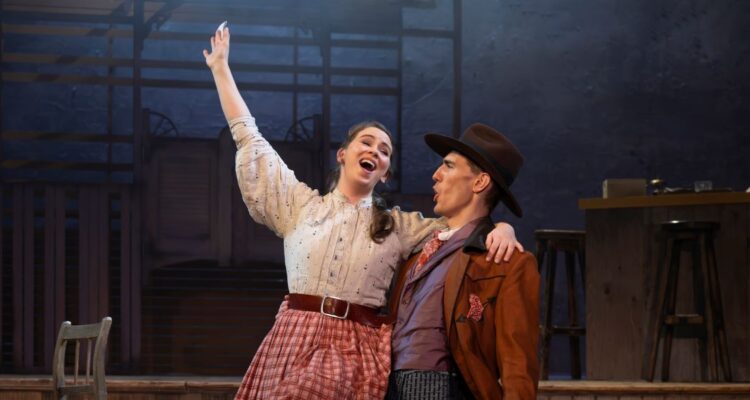With such a familiar opera as ‘The Barber of Seville’ a lot depends on the particular take of the director. John Savournin has made a bold choice in relocating this ‘opera buffa’ to the American Wild West, but it all comes off remarkably well. Bartolo’s residence becomes a saloon bar signalled by a sign and a signature double swing door, and the split-level stage at Wilton’s works well in differentiating the sections of the action, whether private and conspiratorial or concerted ensemble.
We do without the overture, and are plunged straight into rapid-fire action. It is quite a long evening, but it certainly does not feel so in such a lively and spirited production. Those familiar with Savournin’s way with G&S will recognise many of his signature touches here – fluent naturalism, scope for each singer to build up character, and exploration of the full spatial resources of the stage with constant dynamic movement that never incommodes the singer’s vocal production.
Musical director David Eaton makes a double contribution here. As so often he coaxes some wonderful colours out of a somewhat recalcitrant piano – for example, he depicted the storm in the second half with great skill and sensitivity when it is just the piano at work and no voices at all. The singers were all supported flexibly, and seemed very much at ease within the framework of his virtuosic accompaniments. However, over and above this musical foundation he is also responsible for a delectably witty and felicitous translation of the libretto, which fitted the notes and sounded plausible without archness or archaism.
To anyone new to this opera, we are dealing essentially with the prequel to the plot of Beaumarchais’ ‘The Marriage of Figaro’. None of the exquisite psychological light and shade we get in Mozart, but rather a rapidly moving romp of sly deceptions and bravura improvisations, all based around separating Rosina from the machinations of her manipulative guardian, Bartolo and his sidekick, Basilio. The barber, Figaro, finds ways of enabling the debonair Count Almaviva, disguised of course, just to add another layer of complexity, to marry the lady; and like any crafty servant in opera, Figaro manages to enrich himself mightily along the way.
There were some alternate castings, so on press night I heard Joseph Doody as Almaviva and Samantha Price as Rosina. Both were outstandingly good – vocally secure and relishing the comic possibilities of their roles and the twists and turns of the deceptions and bluffs of the plot. As Figaro, Jonathan Eyers was an excellent master of ceremonies, and Matthew Kellett, a stalwart of Charles Court Opera, provided a fine foil as Bartolo, striking just the right balance between conventional outrage and precise comic timing. Ellie Laugharne makes the most of Berta’s single aria by delivering a saucy vaudeville turn worthy of both a saloon bar, and indeed of Wilton’s itself; and Hugo Herman-Wilson is plausibly ingratiating and gormless as Basilio. Arthur Bruce completes the cast with tidy performances of all the smaller roles.
This is an entirely apposite reworking of an old favourite that makes you appreciate the qualities of the original afresh. It would be a wonderful introduction to audience members uncertain about opera, while offering a delightful evening out for regular afficianados.
Composer: Gioachino Rossini
Libretto adapted by David Eaton
Venue: Wilton’s Music Hall
Director: John Savournin
Music Director: David Eaton
Cast: Arthur Bruce, Joseph Doody, Jonathan Eyers, Hugo Herman-Wilson, Matthew Kellett, Ellie Laugharne, Samantha Price
Until: 23rd March 2024
2 hrs 20 mins with interval
Photo Credit: Bill Knight

